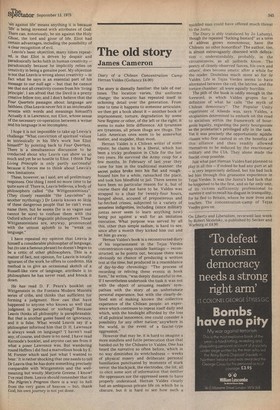The old story
James Cameron
Diary of a Chilean Concentration Camp Hernan Valdes (Gollancz £4.00) The story is dismally familiar: the tale of our times. The location varies, the uniforms change; the scenario has repeated itself in sickening detail over the generation. From time to time it happens to someone articulate, we then get a book about it — another book of imprisonment, torture, degradation by some New Regime or other, of the left or the right; it seems to make little difference. All tyrannies are tyrannies, all prison thugs are thugs. The Latin American ones seem to be somewhat nastier, and stupider, than most.
Hernan Valdes is a Chilean writer of some repute; he claims to be a liberal, which has been a tricky profession in Chile for the last two years. He survived the Army coup for a few months. In February of last year they came for him in the traditional manner: the secret police broke into his flat and roughhoused him for a while, ransacked the place, and took him blindfold to jail. There seems to have been no particular reason for it, but of course there did not have to be. Valdes was strapped to a chair for twenty-four hours, banged about, accused of preposterous and far-fetched crimes, subjected to a variety of senseless indignities, including (since military juntas never seem to learn anything new) being put against a wall for an imitation execution. What purpose was served by all this, other than simple sadism, is hard to see, since after a month they kicked him out and let him go away.
Hernan Valdes's book is a reconstructed diary of his imprisonment in the Tejas Verdes concentration-canp outside Santiago — reconstructed, as he points out, because there was obviously no chance of producing a written text at the time, but produced in a resemblance of day-by-day chronology. "The process of recording or reliving these events in book form," he writes, "was deeply distasteful to me. If I nevertheless undertook the task it was not with the object of arousing readers' sympathies with the story of an unfortunate personal experience, but with the clearly-defined aim of making known the collective experience of the Chilean people:' an experience which continues to repeat itself daily and which, with the hindsight afforded by the loss of all political innocence, one could consider a possibility for any other natioryranywhere in the world, in the event of a fascist-type aggression."
However that may be, it is hard to imagine a more mindless and futile persecution than that handed out by the Chileans to Valdes. One has heard the narrative so often before, which in no way diminishes its wretchedness — weeks of physical misery and deliberate personal humiliation punctuated by moments of stark terror: the blackjack, the electrodes, the lot; all to elicit some sort of information that neither the oppressors nor the oppressed seem to have properly understood. Hernan Valdes clearly had an ambiguous private life on which he is obscure, but it is hard to see how such a muddled man could have offered much threat to the Junta.
The Diary is ably translated by Jo Labanyi, though the repeated "fucking bastard" as a term of address grows monotonous; have the Chileans no other honorifics? The author, too, is almost extravagantly obsessed with defecation — understandably, probably, in the circumstances, as all jailbirds know.. The poetry of closely-observed faeces, his own and others', does become emetic after a while for the reader. Doubtless much more so for Sr Valdes. Life in Tejas Verdes seems to have alternated between the cell, the latrine, and the torture chamber; all were equally horrible.
The pith of the book is oddly enough in the foreword, in which Valdes gropes for a definition of what he calls "the myth of Chilean democracy". The Popular Unity experiment of Allende was, says Valdes, a utopianism determined to embark on the road to socialism within the framework of bourgeois legality, regarding the petty bourgeoisie as the proletariat's privileged ally in the task. Yet it was precisely the opportunistic rrkiddle classes who first cashed in on the benefits of this alliance and then readily allowed themselves to be seduced by the reactionary military and the CIA. They alone made the fascist coup possible.
Just what part Hernan Valdes had planned to play in all this — if indeed he had any part at all — is very imprecisely defined, but his bad luck led him through this gruesome experience in Tejas Verdes. It was the Junta's bad luck that he happened to be the first, and so far only one, of its victims sufficiently professional to survive it and to recall his disgust in tranquility, for he fled to Britain, where he now lives and teaches. The concentration-camp of Tejas Verdes goes on.
On Liberty and Liberalism, reviewed last week by Robert Skidelsky, is published by Secker and Warburg at £4.90.


































 Previous page
Previous page